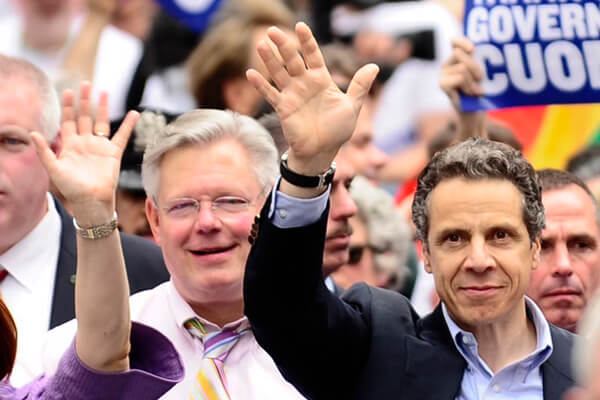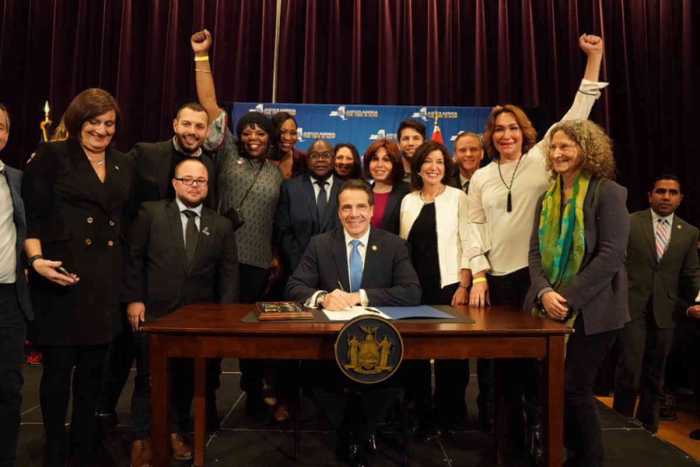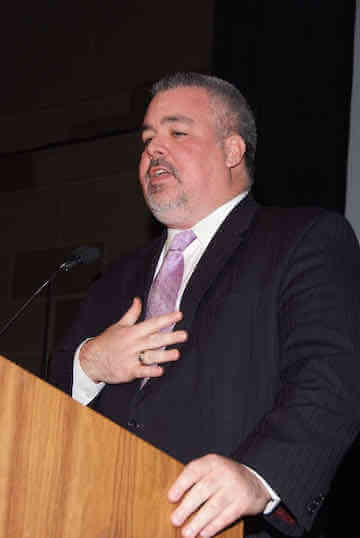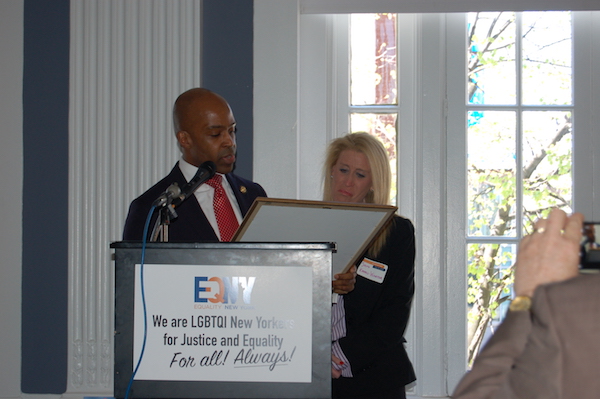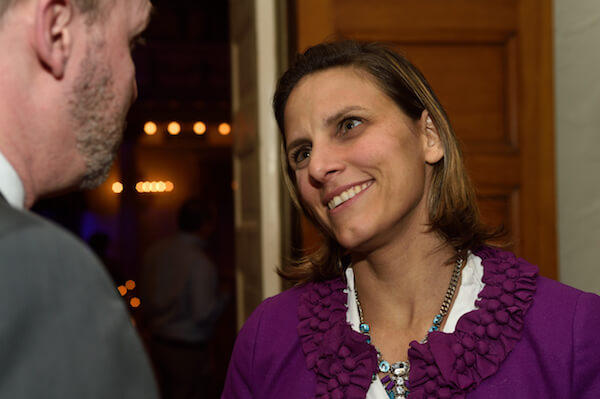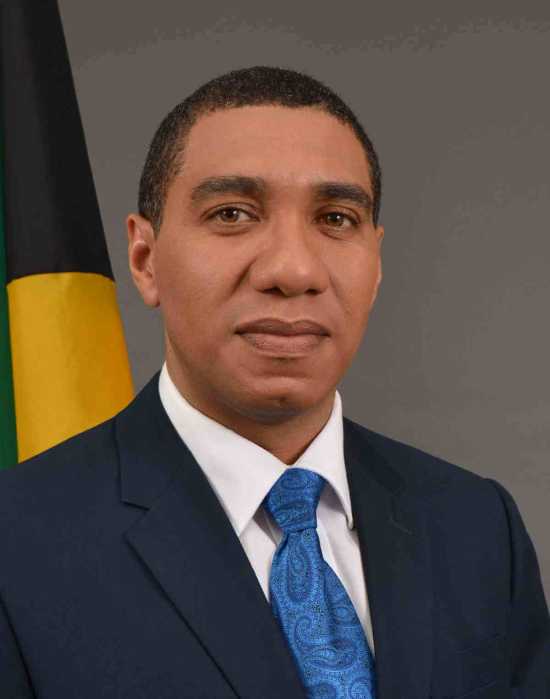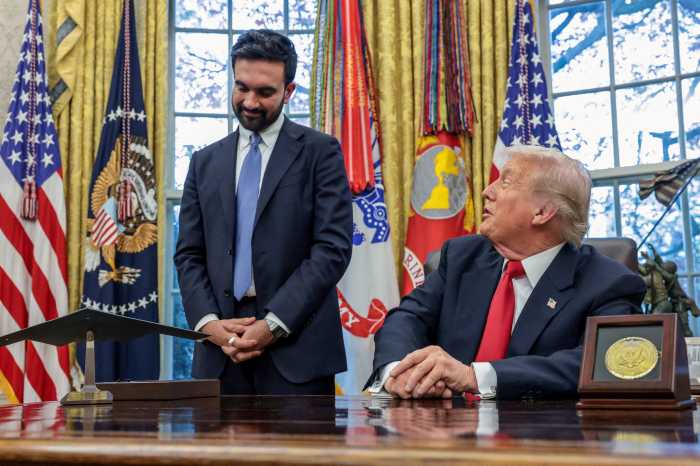Governor Andrew Cuomo got a hero's welcome in the 2011 LGBT Pride Parade, two days after signing New York's marriage equality law. | WILLIAM CHARLES ALATRISTE
Despite the near certainty of his reelection on November 4 –– likely with a comfortable enough margin to keep him near the top of the heap nationwide among Democrats not named Clinton –– Governor Andrew Cuomo has not had an easy time this year with progressives, who are among the party’s most energized activists.
Outmaneuvering Mayor Bill de Blasio on funding for pre-K education, he rejected calls on the left for redistributing the state’s tax burden. Though fracking has been held at bay the past four years, environmentalists are suspicious of the governor’s failure to commit to the outright ban they’d like to see. And Cuomo’s heavy-handed disbanding of his Moreland Commission on public corruption has disappointed advocates for transparency and election reform.
And so, in the September 9 primary, a governor nobody seriously thought wouldn’t get a four-year contract renewal in office was kept to just 62 percent of the vote against a poorly funded and previously little-known law professor, Zephyr Teachout.
In one key progressive precinct, however –– the LGBT community –– Cuomo has a powerful trump card: his leadership role in enacting marriage equality in New York in his first six months in office –– when same-sex couples could legally wed in only five other states.
Asked at the campaign’s only debate on October 22 to explain his attacks on what he’s called Republican opponent Rob Astorino’s “ultra-conservative philosophy,” the governor mentioned groups of New Yorkers that Westchester’s elected county executive “disrespects,” including women, minorities, immigrants, and gays.
“He disrespects gays by being against marriage equality, which is a question of equal rights,” Cuomo said of his GOP rival. “And why would we discriminate against gays? And that’s not who New Yorkers are, and I don't believe there’s political support for a politician who has that position.”
Little elaboration is needed to remind voters –– and the LGBT community, in particular –– how crucial the governor was to the successful 2011 gay marriage drive. The issue took a drubbing in December 2009, losing in the State Senate in a 38-24 vote. Eighteen months later, the Senate approved it with one vote to spare, 33-29.
Cuomo seemed to be everywhere in the final push: disciplining key advocates to forge a unified effort, helping bring on board key conservative Republican, but pro-gay, donors in funding a campaign that ran to several million dollars, enforcing party unity –– except for the Bronx’s Ruben Diaz, Sr. –– among Democratic senators, wooing four Republicans to the pro-equality fold, and executing an end game that forced the GOP majority to allow a floor vote.
Indeed, a new book out in November from Marc Solomon, a longtime veteran of the marriage equality movement who is national campaign manager at Freedom to Marry, paints the governor as nothing less than the indispensible man in the June 2011 victory.
The Agenda Beyond Marriage Equality
Cuomo’s bona fides on marriage, however, have not shielded him completely from criticism among LGBT advocates. Reduced state funding for homeless youth sparked anger during his first few budgets, and transgender activists are frustrated that the Gender Expression Non-Discrimination Act (GENDA) remains stalled after nearly a dozen years of effort.
When the Legislature adjourned in June, Democrats aimed their fire primarily at the coalition of Republicans and five rump members of their party organized as the Independent Democratic Conference (IDC) who run the Senate and did not allow a GENDA vote.
Still, Cuomo’s silence on on the issue was also noted.
“We would like to see more from the governor on GENDA,” Nathan Schaefer, executive director of the Empire State Pride Agenda (ESPA), told Gay City News during the Senate’s final weeks. “He said it was a priority in 2011, but we haven’t heard from him since. And the Senate leadership will need to hear from the governor on this if it is to move.”
Too late for this year’s legislative session but not for the September primary, Cuomo, on August 19, sent ESPA’s board a letter stating, “Per earlier conversations with my office, I write to reiterate my deep commitment to protect the rights of all New Yorkers, including those in the transgender community.” The letter arrived two days before the group’s endorsement of his reelection.
At the Pride Agenda’s Manhattan fall dinner on October 16, the governor repeated that pledge in a video message (follows at the end of story below), where he said, “Now is not the time to be complacent. Now is the time to redouble our efforts.”
Noting that the state, earlier this year, updated its policies “to make it easier for transgender New Yorkers to change their birth certificates” (ahead of New York City), Cuomo added, “But we need to do more. We need to pass GENDA.” He also committed to press for a measure prohibiting so-called conversion therapy by state-certified mental health professionals aimed at LGBT minors. That bill, too, won Assembly passage but received no vote in the Senate.
The Battle for an LGBT-Supportive State Senate The failure of the five-member IDC Conference –– all of whom had voiced support for both GENDA and the conversion therapy ban –– to force their GOP coalition partners to allow votes on the two bills strengthened the argument among many advocates that Democratic control of the Senate was needed before either could become law.
Through much of his four years as governor, Cuomo seemed comfortable with Republicans running the Senate, but they did pose a major block to one of his key goals –– the 10-point Women’s Equality Act. There, the strengthening of abortion access rights later in pregnancy where a woman’s health is at risk sparked intractable GOP opposition.
If that were not enough for the governor to conclude he needed to press for Democratic Senate control in the November elections, the Working Families Party threat in the spring to endorse Teachout instead of Cuomo led to a brokered deal in which he committed to work for such a flip. Shortly thereafter, the IDC announced it had reached agreement with the Democratic Conference to return to the party fold come January.
Since then, there has been grumbling that Cuomo was not living up to his end of the bargain. Though he has slowly gotten around to endorsing Democrats in the handful of districts that are truly contested, he has largely left the task of personal appearances with those candidates to his lieutenant governor candidate, Kathy Hochul. As the New York Times noted, at a recent Long Island rally where he endorsed Adrienne Esposito, the Democratic candidate for an open seat, she was not given a speaking role.
The weakness of the Democratic slate, however, may be as much a factor as the governor’s lukewarm efforts. Three upstate Democratic incumbents –– Terry Gipson, Cecilia Tkaczyk, and Ted O’Brien –– are currently trailing their Republican challengers by double-digit margins, according to recent Siena College polls, which also put Esposito behind by 27 points on Long Island. Democrats appear to be pinning hopes on Democrat Justin Wagner’s ability to pick up the seat being vacated by retiring Republican Greg Ball, but, in the third open contest for a seat currently held by a Republican –– George Maziarz, also retiring –– Capital New York pointed to a poll by labor groups that has the Democrat, Johnny Destino, down by 17 points.
Democratic hopes in the Senate are also complicated by Simcha Felder, a socially conservative Brooklyn Orthodox Jew hostile to LGBT rights who was elected as a Democrat but caucuses with the Republicans separate from the IDC. What he would do if his seat were the deciding vote on who holds the majority next year is unknown.
Finally, there is Mark Grisanti, the two-term Buffalo-area Republican who lost his party’s primary in September but is running on the Independence Party line and is very much still in the mix for November 4. Grisanti was one of the four Republicans Cuomo brought on board for the marriage equality vote in 2011 and the governor clearly feels bound by his commitment then not to support challenges to reelection bids among that quartet. In fact, he said he has not ruled out the possibility of actually endorsing Grisanti.
Cuomo is not the only one who retains loyalty to Grisanti for his stepping up on marriage. The Pride Agenda also endorsed him, and in comments to Gay City News said he has committed to support both GENDA and the conversion therapy ban. Though advocates have long been confident that a few Republican votes could be found for GENDA if it made its way to the floor, Grisanti’s position makes him the first GOP senator to go public.
Even the Stonewall Democratic Club of Western New York has held back from endorsing its party’s candidate in the race, Marc Panepinto –– a progressive activist with strong LGBT ties –– given the abiding good will toward Grisanti. According to the club’s president, Bryan Ball, the group has considered the question at several meetings but each time tabled it, in part, he said, based on arguments made by local LGBT activists with looser party affiliations than the core of the group’s membership.
At the same time, Stonewall is mindful that Gristanti’s support for GENDA and banning conversion therapy aimed at youth might not translate into success for the two measures should he be reelected and Republicans maintain control of the Senate. And, Ball said, despite Grisanti’s rejection in the GOP primary, he’s heard no talk that the incumbent would do anything but stay in the Republican Conference if he returns to the Senate next year.
Ironically, one of the issues on which Grisanti is least palatable to progressives is his opposition to the abortion protections offered in Cuomo’s Women’s Equality Act, a point driven home by critics including choice advocates and the Working Families Party. The incumbent also opposes a state DREAM Act –– which the governor took after Astorino for not supporting in this week’s debate –– that would provide tuition assistance to undocumented immigrants.
Reshaping the State High Court, Moving on AIDS
As the election approaches, Cuomo has taken several other high profile steps focused on concerns in the LGBT community. On October 17, he announced he would not reappoint Judge Victoria Graffeo to another term on the Court of Appeals, the state’s highest bench, where she would have served another eight years until reaching 70, the mandatory age of retirement.
In recent months, the Pride Agenda, the Human Rights Campaign, and the LGBT Bar Association of Greater New York, or LeGaL, all pressed him to look elsewhere to fill that seat on the seven-member court. They faulted Graffeo not only for her vote against marriage equality in 2006 –– where her dissent argued that, like gays, heterosexuals are also barred from marrying people of the same sex –– but also for her support of a 1991 Court of Appeals precedent that refuses to recognize parental rights for anyone who does not have a biological, adoptive, or marriage tie to a child. Especially in the years before same-sex couples had any legal recognition under New York law, that precedent repeatedly hindered claims made by de facto parents, no matter how long and deep the familial tie they had to both their child and to the child’s biological parent.
In a written release, the Pride Agenda’s Schaefer praised Cuomo’s choice, Leslie Stein, an intermediate appellate judge from Albany, for her “favorable record on furthering civil rights, including gender equality.”
Earlier the same week, Cuomo also moved on a key AIDS initiative, naming more than 50 New Yorkers to a task force to implement a plan aimed at effectively ending the AIDS epidemic in New York by 2020 through the reduction of annual HIV infections to roughly 750 a year. The governor embraced the goal –– which has been a major priority of local advocates for some time –– during Gay Pride Month and has now also agreed to their request that community members join with the state and city in helping put the plan into action.
The task force includes dozens of well-known civil rights and AIDS activists from the LGBT community, including Schaefer from the Pride Agenda, Housing Works CEO Charles King, Gay Men’s Health Crisis’ current and immediate past leaders, Kelsey Louie and Marjorie Hill, Bailey House’s Regina Quattrochi, Jay Laudato, executive director of the Callen-Lorde Community Health Center, Mark Harrington from the Treatment Action Group, longtime ACT UP members Peter Staley and Jim Eigo, VOCAL-NY’s Jennifer Flynn, Dr. Perry Halkitis, who teaches and heads up prevention studies research at NYU, and Dan Tietz, who works for the city Human Resources Administration.

